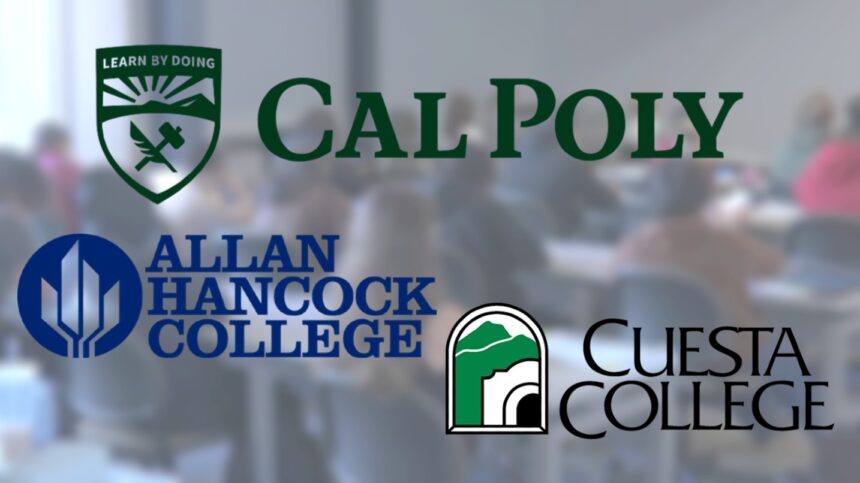New transfer program allows some local college students to earn Cal Poly degrees on Hancock or Cuesta campuses

SAN LUIS OBISPO, Calif. - Cal Poly has announced the creation of a new program that will allow some transfer students from Allan Hancock College and Cuesta College to earn four-year degrees while on the two community college campuses.
The new "2+2 program" is currently underway in Santa Maria at Hancock College and will provide 20 students with an opportunity to obtain a Cal Poly bachelor’s degree in sociology without having to travel to San Luis Obispo for classes.
While they are taking classes on the Hancock campus, the transfer students enrolled in the program are Cal Poly students who will finish their remaining two years of studies in Santa Maria.
"These 2+2 programs demonstrate our commitment to fostering strong partnerships with our local community colleges," said Cynthia Jackson-Elmoore, Cal Poly Provost and Executive Vice President for Academic Affairs. "These collaborations are inherently linked to our role as a steward of place, supporting the educational and professional aspirations of students across our region."
The Cuesta program will be designed for students in liberal studies who are pursuing teaching careers and is scheduled to begin in fall 2025.
"We are excited to see the continued growth of local student representation at Cal Poly," said Terrance Harris, Cal Poly Vice President for Strategic Enrollment Management. "We know that admission to Cal Poly remains incredibly competitive. We also know we have some of the best and brightest students right here in our community."
While the 2+2 program is a welcome addition at Hancock College, leaders and students at the school are expressing their desire they to see it reach a broader scale.
"We're happy that we have 20 students on campus from our community that are enrolled in the sociology program," said Kevin Walthers, Allan Hancock College Superintendent/President. "Unfortunately, what our community has been asking for for more than a decade is scalable programs that meet market needs. We tried to work with Cal Poly, and we haven't been able to get that kind of a commitment from them. We're hoping that we can actually get a commitment for when programs will be offered, and at what scale that will be offered because that's what our community needs."
Walthers emphasized there is a great need for Hancock students to have the opportunity to stay in the Santa Maria Valley and Northern Santa Barbara County and obtain a four-year bachelor's degree, so much more is needed.
"Right now, we have hundreds of students in this community who've received degrees from us who have not transferred because the cost is just too prohibitive," said Walthers. "In fact, even of our students that transfer to Cal Poly 25% of them never enrolled, and the feedback we get from those students is it's just too expensive. It's $11,000 a year, plus the cost of commuting back and forth, so what our students need and what our community has been asking for for a long time is an affordable option that will serve the students of this community."
Hancock graduate Anais Diaz is a student Walthers is referring to. The Santa Maria native was hoping to transfer into the new 2+2 program, but wasn't one of the 20 students who were accepted.
"It was extremely disappointing," said Diaz. "I live here. I was born and raised here. I currently work here. My career is here, so it just doesn't make a lot of sense to be able to move, quit my job and to go to college. I think that these opportunities need to be more available for our community, specifically for Hancock students and anyone in the Central Coast. Their 2+2 program would just be life changing for a lot of individuals who want to be able to continue to live here, to work here, while also going to school, maybe being a single parent, living with different family dynamics. It's just the ideal program for every walk of life."
Walthers added that he, along with other leaders with the school and the greater community, have long been working towards establishing more educational opportunities beyond the traditional two-year degree the community college has provided for decades.
"We're continuing to work towards our baccalaureate degree," said Walthers. "Every community leader, every municipality, the county, all of the service organizations in our community are supportive of Hancock serving our own students. We should be able to take our own destiny into our hands, right? That's that's what we're looking forward to doing. There's a need for entry level kind of workforce, HR managers, office managers, salespeople, all of those kind of things where you'd want to a degree for. We know those credentials allow people to stay employed more often than not."
Harris pointed the 2+2 program is just now in its initial phase, and pointed out Cal Poly will examine how successful the initial two programs are at two community college campuses, and will later determine if additional students could be added, and if other areas of study may potentially be included for future expansion.
"We're excited about these initial programs," said Harris. "We want to make sure that we continue to build on the programs that we have established and continue to fine tune them as we go along and learn from this initial phase. It will undoubtedly lead to other opportunities to grow these partnerships and hopefully create additional programing into the future given the demand and the ability to deliver the classes and the space to deliver the classes. If there's opportunity for growth, that certainly would be a welcome opportunity."
